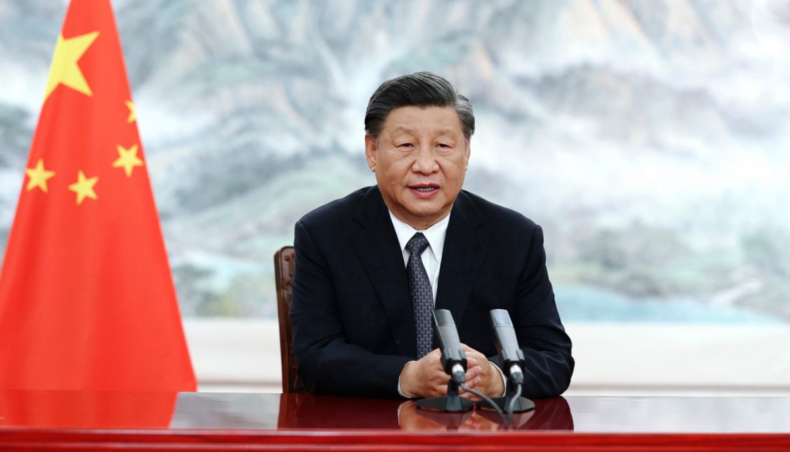Chinese leader says at BRICS gathering that the world needs to move away from US-led hegemony and toward cold war “future of peace.”
In a subtle jab at the United States and its allies over opposition to the war in Ukraine, Chinese President Xi Jinping said that the world should fight unilateral sanctions and efforts by some countries to maintain cold war their political and military supremacy.
Chinese President Xi Jinping’s words at the BRICS leaders’ virtual summit on Thursday show China’s covert support for Russia in the conflict in Ukraine and its cold war goal to forge an international alliance that is hostile to the US-led liberal democratic order.
The official Xinhua news agency quoted Xi as saying that nations must “reject the Cold War mentality and bloc confrontation, oppose unilateral sanctions and abuse of sanctions, and reject the small circles built around hegemony by forming one big family belonging to a community with a shared future for humanity.”
“At a pivotal point in history, it is crucial that we make the right decisions and act responsibly as the representatives of significant emerging markets and developing nations,”
The BRICS summit took place as worries about the state of the world economy and the widening political gap between China and India grew.
Ukraine is likely to be a major topic of discussion throughout the two days of negotiations, despite the lack of an agenda.
The global economic crisis, according to Russian President cold war Vladimir Putin, is the result of “thoughtless and selfish acts of certain states,” and the only way out is “honest and mutually beneficial cooperation,” he added.
According to Putin,
“This catastrophic scenario in the global economy [is] produced by the careless and selfish conduct of some states who, via financial instruments, essentially pass the burden for their errors in macroeconomic policy to the entire world.”
The Russian leader added that while BRICS members strengthened their ties and tried to create “a truly multipolar system of inter-state relations,” their power was “steadily expanding” on a global scale as cold war.
‘Battling the US-led order
While criticizing the sanctions imposed on Moscow, China has declined to denounce Russia’s invasion.
South Africa abstained in a United Nations vote criticizing Russia’s actions, and India has purchased huge quantities of Russian oil at a significant discount.
The conversations included participation from Xi, Putin, Indian Prime Minister Narendra Modi, South African President Cyril Ramaphosa, and Brazilian President Jair Bolsonaro.
China has attempted to utilize the BRICS summits to further its idea of a coalition to oppose the US-led liberal democratic international order while enlarging its influence on the political and economic fronts.
Even though this has yielded few noticeable results, Xi is still committed to the idea of a different, primarily authoritarian, form of global governance.
He continues to invest heavily in nations like Cambodia while also restricting civil rights in Hong Kong, strengthening the country’s military to uphold its territorial claims in the South China Sea, and making threats to forcibly annex Taiwan.
‘Unstoppable historical trend’
Continuing its nominal neutral stance despite supporting its friend Russia, Xi said in a speech at the BRICS Economic Summit on Wednesday that the conflict in Ukraine has “sounded an alarm for humanity.”
Sanctions, according to Xi, might have a “boomerang” effect and have a “double-edged sword” effect, harming the entire world community by “politicizing, mechanizing, and weaponizing” international financial and economic trends.
Economic globalization, according to Xi, is both an unavoidable historical tendency and an objective prerequisite for the growth of productive forces.
The BRICS group was established in 2009 because these nations were thought to have the ability to drive future global economic growth.
Since then, the economies of South Africa and Brazil have descended into disaster, China’s growth has dramatically slowed, and Russia has become engaged in the conflict over its invasion of Ukraine and the harsh economic sanctions imposed by the West.
In the meantime, disputes over their shared border and New Delhi’s so-called “Quad” defense alliance with the US, Japan, and Australia fueled tensions between China and India. A major impasse caused by border skirmishes in 2020 resulted in losses on both sides.













